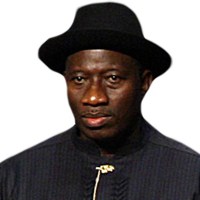Nigeria’s Goodluck Jonathan became acting president in February 2010 following the incapacitation of his predecessor Umaru Yar’Adua. Elected in his own right in April 2011, Jonathan now stands near the midpoint of his first full term in office. His People’s Democratic Party (PDP), which has won every election since Nigeria’s return to democracy in 1999, dominates the executive and legislative branches of the federal government and governs 23 of Nigeria’s 36 states. The advantages of incumbency and party dominance will likely assure Jonathan another term when Nigeria votes again in 2015. Yet insecurity, corruption and stalled policy implementation have provoked broad criticism of his performance, and the remainder of his term is likely to be characterized by high levels of political tension.
Jonathan’s difficulty in reducing violence was on display earlier this month in the northeastern city of Maiduguri, Borno state, which Jonathan visited for the first time as president on March 8. Maiduguri is the nerve center of the Muslim militant group Boko Haram, whose name is a Hausa phrase that connotes opposition to Western education and culture. Boko Haram previously launched uprisings in 2003-2004 and 2009, before Jonathan became president. Since September 2010 the group has attacked numerous government, Christian and infrastructural targets and has become a central challenge for Jonathan’s administration. Along with its splinter group Ansar al-Muslimin (Arabic for “The Defenders of Muslims”), Boko Haram has kidnapped foreigners, including a French family seized last month in Cameroon. The Nigerian military’s Joint Task Force has occupied Maiduguri since June 2011, and has repeatedly claimed success in the fight against terrorism. But its repressive tactics themselves have partly fueled Boko Haram’s grievances.
Within hours of Jonathan’s departure from Maiduguri, seven bombs exploded. Days later, two PDP officials were killed in Borno. As a result, Jonathan’s trip, rather than inspiring confidence in his ability to manage the crisis, drew criticism from local residents and media commentators. Jonathan remains unpopular in the north, where he received less than 20 percent of the vote in many states, including Borno, in 2011. The trip heightened the contrast between Jonathan and an emerging coalition of opposition politicians, the All Progressive Congress, who held their own meeting -- without violence -- in Maiduguri on Feb. 28. Boko Haram thus threatens not only Nigeria’s security but also the president’s political fortunes.

